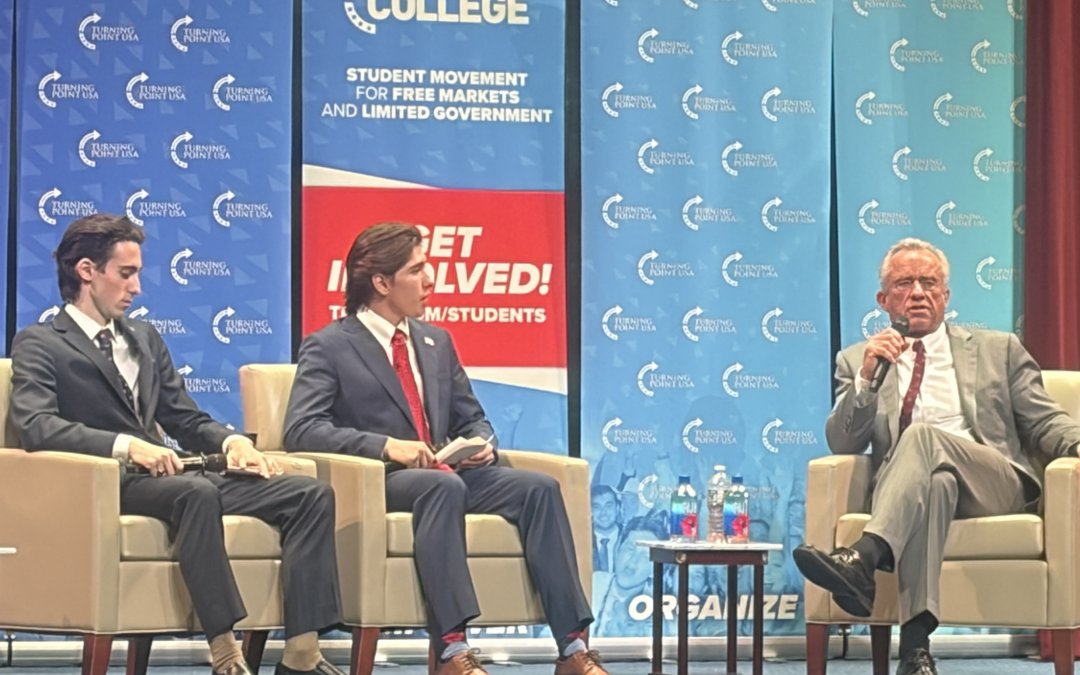WASHINGTON — Health Secretary Robert F. Kennedy Jr. pitched his Make America Healthy Again (MAHA) movement as a disruptive force in health policy at a “fireside chat” hosted by Turning Point USA-Foggy Bottom on Monday evening.
Organizers intended the event at George Washington University to be an exercise of free speech and inquiry, in honor of late right-wing activist Charlie Kirk. Kennedy faced a polarized audience as he reiterated his mission to end chronic diseases in the U.S.
“(My goal is) to end the chronic disease crisis and make America the healthiest nation in the world, like it was when I was a kid,” Kennedy said.
Nearly 100 students protested outside the venue, criticizing Kennedy’s frequent vaccine misinformation and his comments on people with autism. GWU’s Disabled Students Collective also circulated a petition urging university administrators to prevent Kennedy from speaking on campus.
RJ Doroshewitz, president of GWU’s chapter of Democracy Matters, said Kennedy has spread “baseless conspiracy theories” and has harmed marginalized communities at the university, including transgeneder students and students with autism.
“We believe in truth. We believe in the rule of law. We believe in science,” Doroshewitz said. “RFK — I wish he did, but he does not reflect any of those values.”
Inside the event, the crowd mostly cheered for Kennedy as he doubled down on some of his more controversial positions.
Kennedy claimed antidepressant SSRI drugs are a possible cause of mass shootings, insisted that the Trump administration had not cut funds for clinical trials, reframed pandemic-era public health measures as constitutional violations and praised recent HHS efforts to initiate studies on the link between vaccines and autism.
There is no evidence that SSRIs cause people to commit mass shootings, the National Institutes of Health terminated grants for 383 clinical trials between Feb. 28 and Aug. 15, federal courts have upheld states’ authority to enact public health laws and rejected claims that refusal to mask was protected speech and multiple peer-reviewed studies have rebuked Kennedy’s claim that vaccines cause autism.
The event was the first hosted by the brand-new Foggy Bottom chapter of TPUSA. Chapter President Ryan Van Slingerland and GWU College Republicans Vice Chairman Paul Lieb co-moderated the discussion.
Lieb told Medill News Service the chapter chose to host Kennedy because of his influence within the Trump administration, and added that Kennedy has made “a lot of effective changes.”
“It’s hard to go up there, especially when you are the secretary of one of the most influential departments in the entire nation and then trying to defend every little thing, especially to college students,” Lieb said.
As the Q&A portion began, dozens of audience members rushed to line up to ask Kennedy a question, pressing him on his public health qualifications, mass HHS firings, food labeling and the opioid epidemic. One student asked Kennedy about his anti-vaccine claims, to which Kennedy replied: “I believe what I’ve always believed.”
Zach Novick, who attended the event, said the questions, and the protest, largely focused on concerns about national issues and reflected deep societal polarization, but added that he appreciated the organizers’ goal of civil discussion.
“(Kennedy) is such an interesting figure within current politics. I can’t really think of anyone else that I know who’s like him,” Novick said. “I think it’s good that he’s out here trying to at least communicate what he’s feeling.”
Novick said he was particularly interested in Kennedy’s claim that federal agencies had long been influenced by special interests such as the pharmaceutical industry.
Throughout the event, Kennedy framed the MAHA movement as a bipartisan agenda blocked by partisan optics, not by substance. He claimed Democratic governors privately agree with him on food dye bans, SNAP waivers and whole-food school lunches, but refuse to adopt the MAHA label.
Kennedy also argued the rise of chronic diseases is an issue that uniquely impacts younger generations. He blamed his own generation for failing young people, but said that his movement would give them the information to address the environmental causes of chronic disease.


